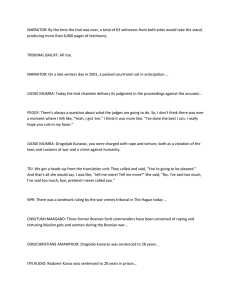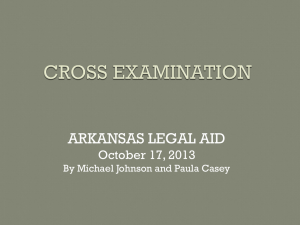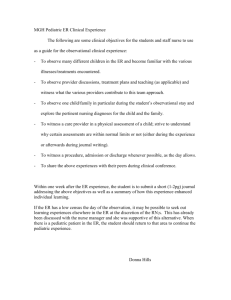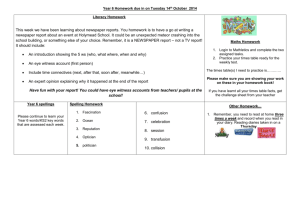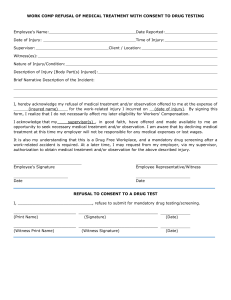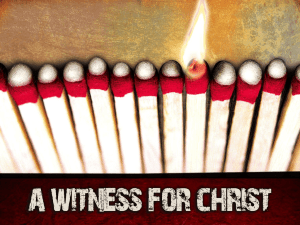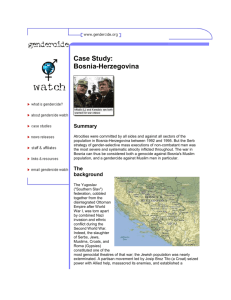WITNESS 99: I don`t feel shame. Still, I don`t want people to look at
advertisement
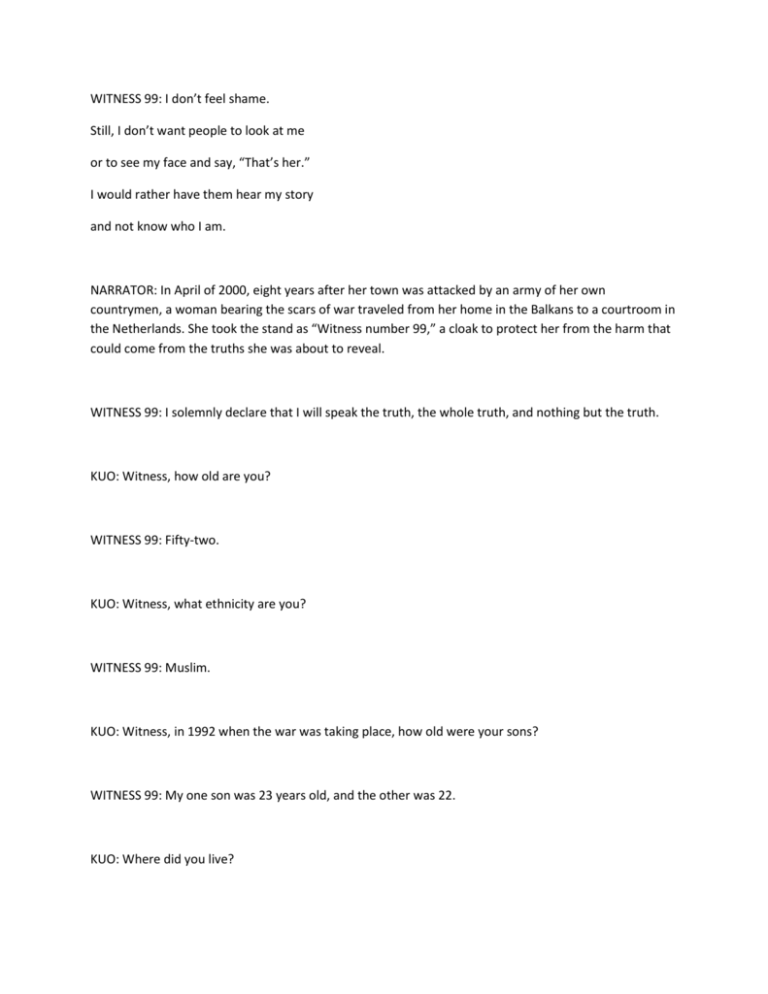
WITNESS 99: I don’t feel shame. Still, I don’t want people to look at me or to see my face and say, “That’s her.” I would rather have them hear my story and not know who I am. NARRATOR: In April of 2000, eight years after her town was attacked by an army of her own countrymen, a woman bearing the scars of war traveled from her home in the Balkans to a courtroom in the Netherlands. She took the stand as “Witness number 99,” a cloak to protect her from the harm that could come from the truths she was about to reveal. WITNESS 99: I solemnly declare that I will speak the truth, the whole truth, and nothing but the truth. KUO: Witness, how old are you? WITNESS 99: Fifty-two. KUO: Witness, what ethnicity are you? WITNESS 99: Muslim. KUO: Witness, in 1992 when the war was taking place, how old were your sons? WITNESS 99: My one son was 23 years old, and the other was 22. KUO: Where did you live? WITNESS 99: Foca. BOSNIAN NARRATOR: In an attractive mountainous region abundant in lush forests, at the confluence of the Drina and Cehotina rivers, lies the small town of Foca. WITNESS 99: I was born in Foca. Things were good for us. We had a good life. We had everything before the war. I couldn’t imagine my neighbor hurting me, or me hurting a neighbor. Everyone was like one family. NARRATOR: “ZR” was also living in Foca when the war began in 1992. She was a newlywed with dreams of starting a family of her own. Z.R.: I got married right before the war. I remember it was a Friday, Friday the 13th. People say this was an unlucky day, but for me it was very lucky. He was really full of love and care. I saw in him a man I could spend the rest of my life with. Z.R.: Life was ideal, and no one cared about who was Serb, who was Croat, who was Muslim. We were all friends, all of us. We went to parties and celebrated New Year’s Eve and birthdays and the births of each other’s children. We were in each other’s weddings, best men, maids of honor. Today you cannot even imagine living like that. But that’s really how it was. REFIK: Brotherhood and unity. Brotherhood and unity was the ideology of the Yugoslav society. It meant that we of different ethnicities, different nationalities, living in this country - were brothers. I was in a classroom with Serbs, Croats, Jews, Gypsies, Muslims. We didn’t have a clue who was a Serb, who was a Croat, who was - I mean this was completely irrelevant to us. We had a saying that a neighbor is much more important than your brother. I’m painting a picture of a perfect existence, I know. But the overall spirit in which we lived was this. NARRATOR: The fabric of brotherhood and unity that kept ethnic strife well under wraps in Yugoslavia began to fray following the death of Socialist leader Marshall Tito in 1980. NARRATOR: By the early 1990s, nationalist leaders were dredging up centuries-old ethnic divisions. Muslim and Croat leaders were pushing for independent states, while Serb politicians were gaining strength behind claims of an impending Islamic takeover. SLOBODAN MILOSEVIC: At home and abroad, Serbia’s enemies are massing against us today as in the past. NARRATOR: Three raised fingers of the Serbian, ultra-nationalist, “Chetniks” became a foreboding sign to the country’s Muslims. REFIK HODZIC: Bosnian Muslims were so dehumanized through the propaganda. RADOVAN KARADZIC: I warn you, you’ll drag Bosnia down to hell. You Muslims aren’t ready for war. You could face extinction! REFIK HODZIC: All of a sudden they ceased to be neighbors, workmates. Little girls cease to be little girls, but they became this filth. Z.R.: Suddenly there were divisions between people according to their ethnicity. In Foca, Serbs and Muslims stopped being friends. Z.R.: I noticed that the Serbs started moving their civilian population. They took their children out of the schools and sent them somewhere else. Z.R.: My husband was the manager of his company and all of a sudden all the Serbs went away on some kind of vacation. It was actually for military training. It was all to prepare them, to teach them to shoot, to kill Muslims. Z.R.: That’s when the Serbs started singing their nationalist songs. I remember spending a night together with my neighbor, unable to sleep, scared, because they were singing Chetnik, really Chetnik songs. Serbian nationalists: Fellow Krajisnici Where will we go to slaughter? Where will we go to slaughter? Will it be Croats or Muslims? There will be slaughter There will be slaughter There will be rape WITNESS 99: War was in the air. The Serbs were positioned on the hills, and our movements were being watched. We were paralyzed by fear. Z.R.: One day when we were on our way to work we noticed the checkpoints. They were guarded by Serbs armed with guns. When my husband and I were returning home, an armed Chetnik cocked his gun at us. He put a gun at our throats. That’s a detail you never forget. REFIK: I thought that it was going to pass, that it was simply a turbulence, and everything will calm down, people will see sense. I could never have anticipated what was going to happen. Never. In a million years, never ever. WITNESS 99: That day the Serb army attacked and the shots were coming from every direction. A woman from our village was killed. Her child fell out of her arms. Z.R.: It became clear to everyone that this was war and that they had to save their skins. But where could they go?
